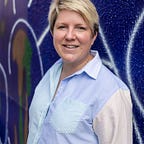Communities of Practice — because sharing is caring!
On Monday, we hosted another delivery communities of practice meet across the Panoply.
One hour, twenty attendees and four great talks.
It was great to hear what other teams and individuals across the group are working on and get the opportunity to spend some time together.
First up was Joyce Wong, delivery manager at FutureGov sharing her recent experience with managing a futures project in infrastructure planning.
Future thinking was a new concept for me. If it is for you too, here’s a short definition
Futures Thinking is a method for informed reflection on the major changes that will occur in the next 10, 20 or more years in all areas of social life, including education. Futures Thinking uses a multidisciplinary approach to pierce the veil of received opinion and identify the dynamics that are creating the future.
Joyce was talking about the powerful intersection of human-centred design and futures thinking, where you focus on “purpose over urgency” and on leaving a legacy in the work you’re producing today and being deliberate about the conversations and the potential impact for the decades to come.
This is about being sustainable, responsible, and is a healthy practice we should all be encouraging our teams to do. Let’s force ourselves out of the temporal perspective and start using system and futures thinking to think outside of ourselves.
Rob Edwards, a user researcher from Difrent, spoke about a recent public beta project in adult social care he has been working on. He gave an overview of the project’s challenges, the solutions they’d proposed, and the outcomes of the team’s efforts to date. It was great to see the extent of the new service dashboard’s impact on the project, and the measurable improvement in registration numbers that followed.
Mariola Romero, delivery manager at Deeson, shared how we can apply a fairly well-known feedback technique to our projects and how we work with teams and clients. She started by pulling out a few of the principles outlined in the agile manifesto, namely
“continuous delivery and “welcoming changing requirements, even late in development” and applying those principles to personal development and reflecting on areas in her role where she might not have been previously living out these two principles.
She gave a couple of examples e.g. sharing a statement of work for review before sending to the client or a client raising some new requirements right at the end of the project. Saying, by this point, her mindset and attitude are quite far from “welcoming” or “continuously delivering” to more of a “can we just ship the thing!?”
As a result, she’s started applying 30% feedback to these scenarios. 30% feedback is a concept, Jason Freeman, from Basecamp has spoken about, essentially sharing work in practice, working in the open, and getting feedback before you’ve invested too much work — exactly what we tell our clients to do!
Mariola also shared how this can be applied to internal processes to speed up feedback reviews. There was also a point on how we can work more in the open with clients, sharing our inner workings in terms of cost estimate templates and ticket averages to forecast costs for future projects quickly and easily before investing lots of time in heavy documentation.
She also importantly touched upon how to create psychological safety within a team or client relationship to do this successfully.
Last but not least was Matt Jukes (otherwise known as Jukesie) from Foundry4 who shared his experience of being interim Head of Product at Essex County Council for the last six months. It was great to hear how starting a role within a Pandemic and helping support a team relatively new to delivering products and digital. He explained some great techniques for gathering momentum and getting people to move in the same direction. Here were some of my key take-aways:
- Think about how to re-shape daily meetings to shake things up, e.g. changing the daily stand up to get people out of old patterns and embracing new ways of doing and thinking
- Set short goals, for this team it was all focused on “shipping something” regardless of how small to focus and empower people that this was possible
- Take the blame if things go wrong and if things go well, let the team take the credit. Creates strong psychological safety and helps build trust when doing new things
- Have lots of 1:1’s, get to know the people on your team and what makes them tick
- Create a service manual and agree on ways of working as a team
- Be rebellious — Matt didn’t say this explicitly but it came through in some of what he was saying. For example, this team wasn’t used to iteration and therefore had a fear that when something launched it would stay that way for several years. As a result, after shipping something, Matt deliberately held back some nicer to have improvements until a couple of days after launch, which kick-started the behavioural change in how people saw product development within the council.
We left sometime in the end for Q&A and it was great to hear the attendees start to draw parallels between some of the themes discussed between the four talks which were all planned in a silo.
We’re looking forward to making this a more regular, hopefully, monthly meeting going forward.
I’d love to get your feedback on formats or ideas for future sessions. I’m pleased to be part of a wider group of talented Delivery Managers that can open up my world and mind to new ways of working and doing things!
